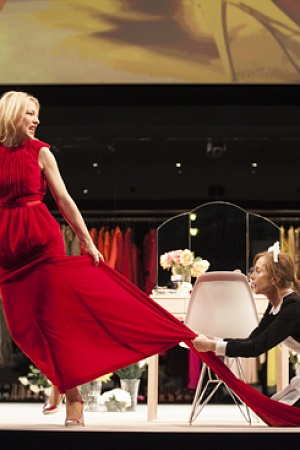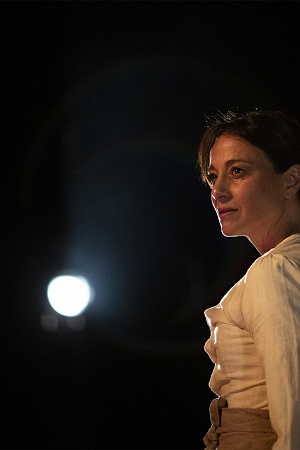The Inheritance

We can look at the literary canon as our cultural inheritance: flawed and incomplete, maybe, but also a balm and a provocation stretching across the centuries. Part of its value lies in the connections we form between great works, the layers of meaning that build up over time like sediment in rock. American playwright Matthew López engages directly with this notion in his monumental seven-hour play The Inheritance, which is divided into two parts of comparable length. It is less a direct adaptation of E.M. Forster’s 1910 masterpiece Howards End than a free association on the novel’s themes and concerns.
The play premièred on the West End in 2018 – where it was rapturously received – before transferring to Broadway the following year. Intriguingly, for a play so tied to its New York setting, the US critics were less favourably inclined (although it still managed to win the Tony Award for best play). It receives its Australian première at fortyfivedownstairs, surely this independent theatre’s most ambitious undertaking since their sublime 2017 production of Tony Kushner’s Angels in America.
While López’s play follows the contours of Kushner’s in many ways, it does not quite reach the same dizzying intellectual heights; it sometimes feels like an overly eager younger sibling, determined to prove it can mix it with the big boys. There are superficial similarities: the length, of course and the long, lively scenes of argument and erudition. There is the insistence on community, a determination to carve out hallowed ground for the lost and the dead. More interesting is the ways in which the two works differ.
Angels in America was written in the white heat of rage, and opened as the AIDS crisis was reaching its zenith. The Inheritance is a far more plaintive and contemplative affair, as concerned with the distant past as the immediate one. It is haunted too – ‘a necessary haunting’, as the sole female character in the play says – by Forster himself, played here with great warmth and gravitas by Dion Mills.
 The Inheritance (photograph by Cameron Grant)
The Inheritance (photograph by Cameron Grant)
Most of the key characters from the novel are here, transposed into contemporary gay men. Forster’s Schlegel sisters become boyfriends Eric (Charles Purcell) and Toby (Tomáš Kantor), living happily in a rent-controlled apartment handed down by Eric’s grandmother. When Eric befriends the elderly Walter (also played by Mills, in a performance of great depth and delicacy), he is drawn into the social sphere of the Wilcoxes, an astronomically wealthy family led by Walter’s partner, the patriarch Henry (Hunter Perske). When Walter dies, he unexpectedly bequeaths his country house to Eric, but the Wilcoxes destroy the will and let the house to a stranger.
Anyone familiar with Howards End will recognise these major plot points and will anticipate the introduction of the ‘poor’ character, Leonard Bast. But López introduces another character instead, the highly privileged Adam (Karl Richmond). Like Leonard, he comes to the boys’ apartment to reclaim an object Toby accidentally took from him, and becomes besotted. The three quickly become entangled in one another’s lives, and for a while enjoy a kind of familial peace.
It is a rich and joyful experience squaring López’s creations with Forster’s, seeing where he cleaves to the novel and where he deviates. Toby is the play’s most compelling character, a long way from the Helen of Forster’s imagination but containing enough of her spirit, vivacity, and impetuousness to remain recognisable. Kantor is astonishing in the role, mercurial and dangerous, self-destructive but hypnotically sexy too. Richmond’s Adam is almost as good, and when López finally introduces Leo – here depicted as a struggling rent boy, achingly vulnerable and needy – and Richmond juggles both roles, the effect is dazzling. These two young actors, already making a name for themselves in notable roles around the country, seem here to emerge as fully fledged stars.
As Eric, a role deliberately less dazzling than those around him, Purcell provides a subtle but galvanising moral centre. His kindness and compassion seem to emanate from within, each movement considered and thoughtful. Like his counterpart in Forster’s novel, Eric is the play’s spiritual centre, the connective tissue binding characters to each other. Every actor who comes in contact with him is improved by his frankness and solicitude.
López adopts a kind of Greek chorus for the majority of the smaller roles, whether they be friends, agents, ushers, or vile sons of Henry Wilcox. People narrate their lives in the third person, in a nod to the play’s literary origins – but also as a way of constructing their own histories. Toby does this as an act of self-delusion; Leo as a cry for help; Eric as a way of putting down roots, of extending his influence. It is a wonderful device, deeply attuned to the sensibility underpinning Forster’s work. Only connect, each other to each other, down through the years.
Director Kitan Petkovski orchestrates the action with supreme grace and confidence, those seven hours flying past. He is able to eke out the moments of hilarity and joy – the play is full of bitchy banter, of filth and sex and debauchery – but he also knows when to silence the room so that a grand and intricate monologue can breathe. Bethany J. Fellows’s simple set and sharp, stylish costumes are beautifully judged, and Katie Sfetkidis’ lighting is rich and nuanced. The sound design and composition by Rachel Lewindon are marvellously evocative, sometimes lush, sometimes pounding. An epic undertaking, the production is a technical triumph.
The Inheritance isn’t perfect. There are several slides into didacticism and sentimentality, and López has a tendency to spell out what is already beautifully implied, utterly ruining the effect. But in a work of such ambition and scope, where Forster’s work is powerfully – even magically – transformed while retaining its thematic integrity, these flaws become minor quibbles and one can do nothing but applaud. If Forster is our inheritance, then he has been placed in the right hands.
The Inheritance (fortyfivedownstairs), part of the Midsumma Festival, continues at fortyfivedownstairs until 11 February 2024. Performance attended: 21 January.











Leave a comment
If you are an ABR subscriber, you will need to sign in to post a comment.
If you have forgotten your sign in details, or if you receive an error message when trying to submit your comment, please email your comment (and the name of the article to which it relates) to ABR Comments. We will review your comment and, subject to approval, we will post it under your name.
Please note that all comments must be approved by ABR and comply with our Terms & Conditions.